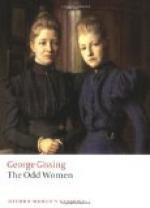It recalled to her with much vividness a memory of girlhood, or indeed of childhood. She thought of that figure in the dim past, that rugged, harsh-featured man, who had given her the first suggestion of independence; thrice her own age, yet the inspirer of such tumultuous emotion in her ignorant heart; her friend at Clevedon—Mr. Smithson. A question from Mary Barfoot had caused her to glance back at him across the years, but only for an instant, and with self-mockery. What she now endured was the ripe intensity of a woe that fell upon her, at fifteen, when Mr. Smithson passed from her sight and away for ever. Childish folly! but the misery of it, the tossing at night, the blank outlook! How contemptible to revive such sensations, with mature intellect, after so long and stern a discipline!
Dreading the Sunday, so terrible in its depressing effect upon the lonely and unhappy, she breakfasted as soon as possible, and left home—simply to walk, to exert herself physically, that fatigue and sleep might follow. There was a dull sky, but no immediate fear of rain; the weather brightened a little towards noon. Careless of the direction, she walked on and on until the last maddening church bell had ceased its clangour; she was far out in the western suburbs, and weariness began to check her quick pace. Then she turned back. Without intending it, she passed by Mrs. Cosgrove’s house, or rather would have passed, when she saw Mrs. Cosgrove at the dining-room window making signs to her. In a moment the door opened and she went in. She was glad of this accident, for the social lady might have something to tell about Mrs. Widdowson, who often visited her.
‘In mercy, come and talk to me!’ exclaimed Mrs. Cosgrove. ’I am quite alone, and feel as if I could hang myself. Are you obliged to go anywhere?’
‘No. I was having a walk.’
’A walk? What astonishing energy! It never occurs to me to take a walk in London. I came from the country last night and expected to find my sister her, but she won’t arrive till Tuesday. I have been standing at the window for an hour, getting crazy with ennui.’
They went to the drawing-room. It was not long before Mrs. Cosgrove made an allusion which enabled Rhoda to speak of Mrs. Widdowson. For a month or more Mrs. Cosgrove had seen and heard nothing of her; she had been out of town all the time. Rhoda hesitated, but could not keep silence on the subject that had become a morbid preoccupation of her mind. She told as much as she knew—excepting the suspicion against Everard Barfoot.
‘It doesn’t in the least surprise me,’ said the listener, with interest. ’I saw they wouldn’t be able to live together very well. Without children the thing was impossible. Of course she has told you all about it?’
‘I haven’t seen her since it happened.’
’Do you know, I always have a distinct feeling of pleasure when I hear of married people parting. How horrible that would seem to some of our good friends! But it isn’t a malicious pleasure; there’s nothing personal in it. As I have told you before, I think, I led a very contented life with my husband. But marriage in general is such a humbug—you forgive the word.’




